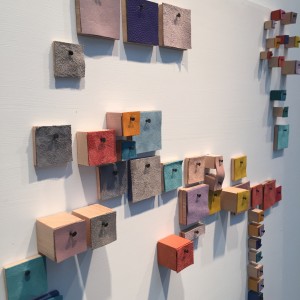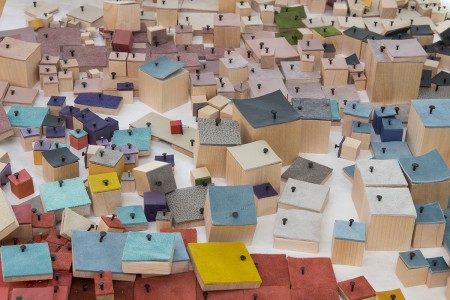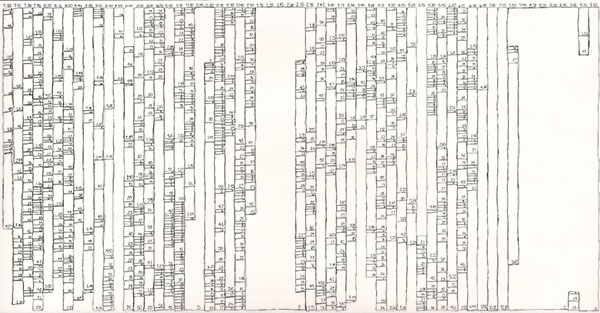Technology will disrupt the art-world, just not in the way you think
/Lots of long-standing businesses have been disrupted in the past decade, you can quickly tick off several on your fingers right now. Music publishing from online digital downloads, vacations from the reputation economy ala Airbnb, finding an address or anything for that matter via google maps. Uber, full stop. I forced myself to stop at 3+1. But, you get the notion of disruption, it's all anyone in the tech world or venture funding business talks about.
I think the disruption of the art-world from technology will not happen cause we digitally reproduce prints, create artist portfolio sites online, or even buy objects from artists directly in the manner of ebooks or music. I think it will be disrupted because art production will become an algorithm. Art making is really a set of rules for combining images, shapes, pattern, rhythm -- and a set of processes for spitting out physical objects. I see a time when the art-world is democratized, by inexpensive to produce art objects that are beautiful, personalized and made just for you. With easy to recycle materials that you don't worry about storing or moving...you have them for a while and swap them out for something different without thinking -- poof from a pandora-like subscription service.
Noooooooo you think, what about Van Gogh or Warhol, those are art objects of enormous value...how could the art market be transformed by something like a smart robot? Well, you can see the beginning -- artificial intelligence software writes sports stories and financial updates, news services are quietly using 'robots' to pump out posts, update twitter and feed the beast of hourly reporting. The rules for writing are in fact an algorithm that can spit out intelligible output. Same can be true for art.
In the case of art, it ceases to simply be an object of admiration or decoration. Art can become personal, like the work I make...self-tracking data turned into pattern as data portraits. Your sleep, time-use, mood, travel patterns, food intake, bio-markers -- the data that describes your unconscious behavior, that makes-you-you can be turned into art. And here is the kicker that makes it addictive, these textured patterns pulled from your seamlessly collected human data feed your emotional need for a connection to the self.
Your brain can't tell the difference from meditative self-reflection or the intake of a personal data-selfie. It just knows that it's feeding the human-loop that you require to feel grounded, mindful, alive. Research will show having these images around you more than 4 hours a day will boost your immune system, and what-the-hell, 3D printed textures are nice on the empty walls of your apartment. Art will circle back to something everyone lives with easily, it's not the rarefied stuff stashed away in museums. Art becomes the way you consume data and updates about yourself.
So abstract art is not your thing. The algorithm can be dialed to landscapes, interiors or portraits with the look of high realism, spray-paint graffiti or extra painterly texture -- just tick the options. Disruption will come when technology makes art meaningful to you personally, it reflects your personal data, is cheap, recyclable and ultimately makes you feel better.










 The "tyranny of tiny tasks," as Wu called it, may only get more tyrannical if the Apple Watch draws in more developers and users, pushing the smartwatch beyond the early adopter community. Computers shifted us from writing occasional time-consuming letters to writing a mounting number of emails. Smartphones allowed us to fire off an exponentially larger number of emails as well as quicker messages through other applications."
The "tyranny of tiny tasks," as Wu called it, may only get more tyrannical if the Apple Watch draws in more developers and users, pushing the smartwatch beyond the early adopter community. Computers shifted us from writing occasional time-consuming letters to writing a mounting number of emails. Smartphones allowed us to fire off an exponentially larger number of emails as well as quicker messages through other applications." You know who you are by where you are in TIME. When you get knocked out, and come to….the first thing the doctor asks is “what is your name” …and “what day is it?” Who you are and where you are in time is vital to your grasp of consciousness, your sense of self.
You know who you are by where you are in TIME. When you get knocked out, and come to….the first thing the doctor asks is “what is your name” …and “what day is it?” Who you are and where you are in time is vital to your grasp of consciousness, your sense of self. Which is all very curious because I'm investigating the notion that YOU are your time, you are defined by how you spend your time, the activities and even unconscious use of time says loads about your psyche, your personality and your inner-self. Your sense of who you are is based on the recollection of recent events, and what you are doing and intend to do. It's your basic orientation in the world.
Which is all very curious because I'm investigating the notion that YOU are your time, you are defined by how you spend your time, the activities and even unconscious use of time says loads about your psyche, your personality and your inner-self. Your sense of who you are is based on the recollection of recent events, and what you are doing and intend to do. It's your basic orientation in the world.
